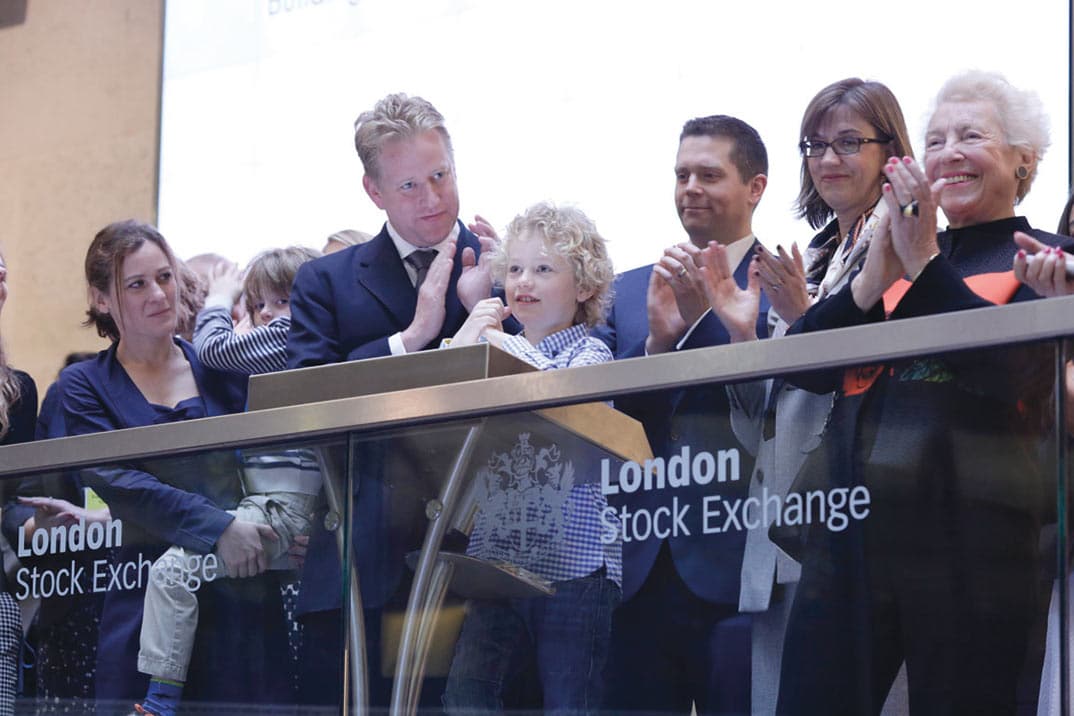A young Tunbridge Wells boy who suffers from autism overcame his personal fears to open the London Stock Exchange last week.
Seven-year-old Samuel Wilson, from the St James’ area, ‘rang the bell’ at 8am on Wednesday, marking the official start to the day and unleashing billions of pounds worth of trades, in a ceremony to highlight World Autism Awareness Week.
Samuel, who attends the Wells Free School part time, was invited by tech entrepreneur and founder of autism research charity Autistica, Dame Stephanie Shirley, who herself had a son with autism.
Despite starting life as a happy toddler who reached all major developmental milestones, by the age of two Samuel’s behaviour started to change and the little speech and skills he had began to disappear.
He was diagnosed a year later.
Samuel’s mother Katie, who fought hard to get an early diagnosis for her son, was keen for him to push the button that rings the Stock Exchange bell, believing it would help raise awareness as well as boost his self-esteem.
She said: “We worked hard with Samuel to prepare him for the day so that he would know what to expect.
“He struggles with strange people and places, bright lights and music, all of which are a big part of the ceremony, but the Stock Exchange kindly made some allowances to make him feel comfortable.
“However, we couldn’t predict how he would react on the day. It is crucial, though, that we support him to do things like this that he can be proud of, and important that people see the real challenges that autism can present.”
The day went off without a hitch, with a large gathering of Stock Exchange staff and Autistica applauding Samuel after he rang the bell.
Jon Spiers, Chief Executive of Autistica, the charity that organised the opening ceremony with the Exchange, said: “We are thrilled to be given this opportunity to highlight the need for autism research, which remains one of the most underfunded areas of medical research.
“We are very grateful to Samuel and his parents for representing Autistica at this prestigious and iconic ceremony.”
Dame Stephanie Shirley, who founded the charity in 2004, feels passionately that research is key in providing better support for those with the condition:
She said: “I made my fortune in business, and it is an honour to be back here today so many years later to talk about the subject that is dearest to my heart.
“I have given the majority of my wealth away to fund autism projects. Although we have made some progress, there is still so much we don’t know about autism and how to best support those like my late son, Giles.
“We need the Government and funders to realise that research is key to really make a long and lasting difference to people’s lives.”
WHAT IS AUTISM?
A mental condition, present from early childhood, characterised by great difficulty in communicating and forming relationships with other people and in using language and abstract concepts.
HOW MANY PEOPLE HAVE AUTISM?
It’s much more common than many people think. There are around 700,000 people in the UK living with autism – that’s more than one in 100. If you include their families, autism touches the lives of 2.8 million people every day. Autism doesn’t just affect children.
WHO IS DAME STEPHANIE SHIRLEY?
The daughter of a Jewish judge and non-Jewish Viennese mother, Dame Shirley was forced to flee her Dortmund home, aged just five, as the storm clouds of war gathered over Europe in July 1939.
As a child refugee travelling with her nine-year-old sister, Renate, Dame Shirley found a new home in Great Britain and grew up with foster parents in Sutton Coldfield.
A keen mathematician, she was granted special permission to learn the subject at a local boys’ school as it was not taught at the Oswestry Girls’ High School where she spent her teenage years.
By the 1950s, Dame Shirley had become a British citizen and worked at the Post Office Research Station at Dollis Hill in London where she built computers from scratch and wrote code in machine language.
In 1962 she married physicist Derek Shirley and set up her own company, Freelance Programmers, with just £6 in starting capital.
She mainly employed women, leading her at one point to have just three male programmers in her 300-strong workforce, whose notable projects included programming Concorde’s black box.
In 1990 she retired to concentrate on philanthropy, giving away more than £67million of her wealth, claiming she ‘needed to’ in order to ‘justify’ the fact her life was saved.
Much of her charity work has focused on helping those with autism and their carers, after her own autistic son, Giles, died following an epileptic seizure at the age of 35.








